-
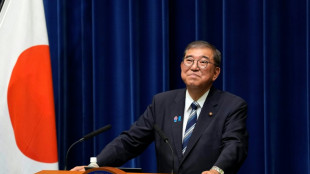 Japan ruling party to pick new leader on October 4
Japan ruling party to pick new leader on October 4
-
Ethiopia inaugurates Africa's biggest dam
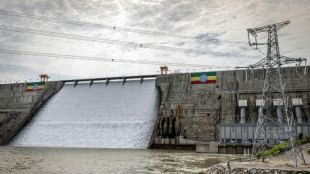
-
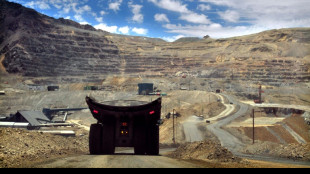 Miners Anglo American, Teck plan new copper giant
Miners Anglo American, Teck plan new copper giant
-
Suriname stun El Salvador, allege racist chants in WC qualifying

-
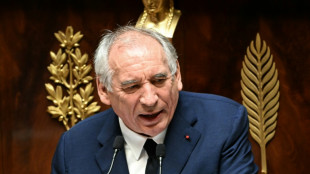 Macron scrambles to find new French PM as Bayrou set to resign
Macron scrambles to find new French PM as Bayrou set to resign
-
Death of Hong Kong's Lai would strengthen democracy message, son says

-
 Markets mainly rise on US rate cut hopes
Markets mainly rise on US rate cut hopes
-
Korean women target US military in landmark forced prostitution lawsuit
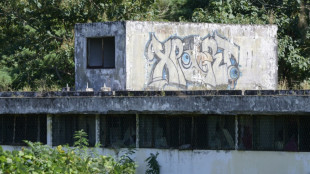
-
 Mistral cements AI lead in Europe with cash infusion
Mistral cements AI lead in Europe with cash infusion
-
Israel says to act with 'great force' in Gaza City
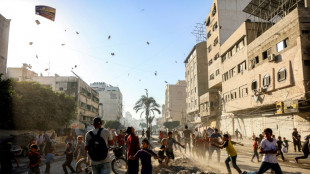
-
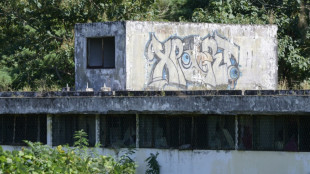 South Korean women sue US military in landmark prostitution lawsuit
South Korean women sue US military in landmark prostitution lawsuit
-
40 years of 'Mario' games that have grown up with fans

-
 AI and iPhones likely stars of Apple event
AI and iPhones likely stars of Apple event
-
Thaksin termination? Prison term latest chapter in political odyssey

-
 Merz to open Munich motor show as engine row threatens to combust
Merz to open Munich motor show as engine row threatens to combust
-
Quiet Tebogo's legs to 'do the talking' in Lyles 200m worlds battle

-
 Gaza aid flotilla says hit by drone, Tunisia says none detected
Gaza aid flotilla says hit by drone, Tunisia says none detected
-
Thai top court orders ex-PM Thaksin jailed for one year
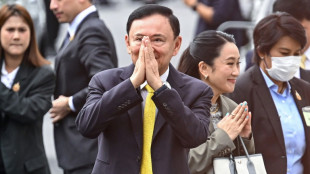
-
 All Blacks great McCaw inspires squad ahead of Springboks rematch
All Blacks great McCaw inspires squad ahead of Springboks rematch
-
Maduro decrees Christmas in October for Venezuela, again
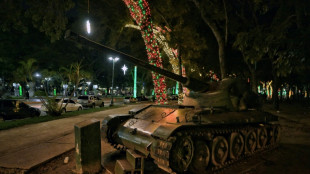
-
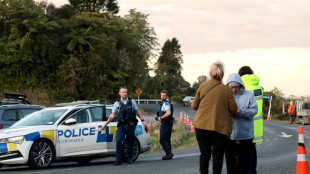 New Zealand police detail slain fugitive father's life on the run
New Zealand police detail slain fugitive father's life on the run
-
McCarthy sparks late rally as Vikings edge Bears in NFL opener

-
 Suriname stuns El Salvador in 2026 World Cup qualifying
Suriname stuns El Salvador in 2026 World Cup qualifying
-
London arms show opens under Israel cloud
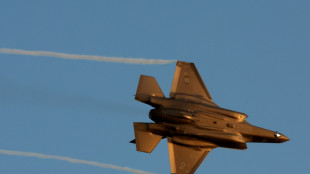
-
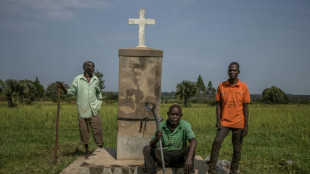 ICC hears charges against Ugandan warlord Kony
ICC hears charges against Ugandan warlord Kony
-
Most Asian markets rise on US rate hopes, Tokyo hits record

-
 Nottingham Forest sack head coach Nuno after rift with owner
Nottingham Forest sack head coach Nuno after rift with owner
-
Thai top court to rule on ex-PM Thaksin's prison term

-
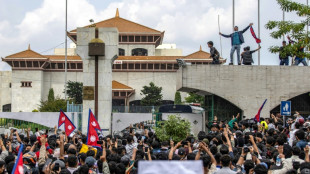 Major social media sites back online in Nepal after deadly protests
Major social media sites back online in Nepal after deadly protests
-
From rocky start to Oscar hopeful: Dwayne Johnson hits Toronto

-
 Murdoch family settles dispute over media empire succession
Murdoch family settles dispute over media empire succession
-
Trump's alleged birthday note to Epstein released by House panel
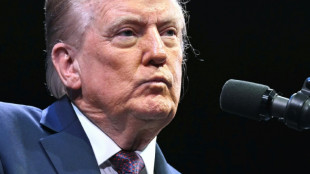
-
 Killing Hong Kong's Lai would strengthen democracy message, son says
Killing Hong Kong's Lai would strengthen democracy message, son says
-
D-Day approaches in Bolsonaro coup trial

-
 Israel film at Toronto fest entrenches industry split over Gaza
Israel film at Toronto fest entrenches industry split over Gaza
-
Thai top court to rule on ex-PM Thaksin's prison stay

-
 North Korea's Kim oversees ICBM engine test: state media
North Korea's Kim oversees ICBM engine test: state media
-
Nottingham Forest sack boss Nuno Espirito Santo

-
 Elevating Imaging, Empowering Flow - AGFA HealthCare at RSNA 2025
Elevating Imaging, Empowering Flow - AGFA HealthCare at RSNA 2025
-
Star Copper Commences Phase 2 Drill Campaign and Advances Copper Creek Target Activities

-
 Angle PLC Announces Change of Adviser
Angle PLC Announces Change of Adviser
-
Alset AI Provides Corporate Update Highlighting Foundation for Growth

-
 Angle PLC Announces Interim Results
Angle PLC Announces Interim Results
-
Trump admin launches immigration raids in Chicago
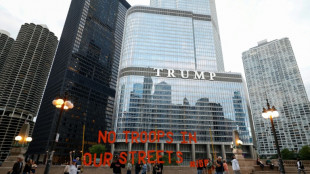
-
 Murdoch family settles dispute on control of media assets
Murdoch family settles dispute on control of media assets
-
Norway PM's left bloc wins election, populists surge

-
 Italy avoid disaster, Kosovo win in World Cup qualifying
Italy avoid disaster, Kosovo win in World Cup qualifying
-
Tonali saves Italy from World Cup disaster against Israel

-
 Late Ben Romdhane goal seals Tunisia berth in 2026 World Cup
Late Ben Romdhane goal seals Tunisia berth in 2026 World Cup
-
OpenAI backs AI-animated film for Cannes debut

Iran's Nuclear Ambitions
The recent US military strikes on Iran's nuclear facilities have raised questions about the current state of Iran's nuclear program and its potential to develop a nuclear weapon. While the US administration claims that the strikes have "completely and totally obliterated" Iran's key nuclear enrichment facilities, there are conflicting reports and expert opinions on the true extent of the damage.
On June 22, 2025, the United States launched a series of airstrikes on three major Iranian nuclear sites: Fordo, Natanz, and Isfahan. The operation, codenamed "Midnight Hammer," involved B-2 Spirit stealth bombers dropping massive bunker-buster bombs and a submarine launching Tomahawk missiles. President Donald Trump announced that the strikes were a "spectacular military success" and that Iran's nuclear ambitions had been "obliterated."
However, a leaked preliminary intelligence assessment from the Defense Intelligence Agency suggests that the strikes may have only set back Iran's nuclear program by a few months. According to sources familiar with the report, the attacks sealed off the entrances to two facilities but did not collapse their underground structures. Additionally, it is believed that some centrifuges used for uranium enrichment might still be intact.
Further complicating the picture, there are indications that Iran may have relocated its stockpile of enriched uranium prior to the strikes. Satellite imagery from the days before the attack shows trucks at the Fordo and Isfahan sites, possibly moving materials away from the facilities. If Iran has safeguarded its enriched uranium, it could potentially resume its nuclear activities more quickly than if the stockpile had been destroyed.
The International Atomic Energy Agency (IAEA) has confirmed that the three sites were hit and has reported extensive damage, particularly at Esfahan and Fordo. However, the agency also noted that there has been no increase in off-site radiation, suggesting that any radioactive materials were not released during the attacks.
Experts are divided on the long-term impact of the strikes. David Albright, president of the Institute for Science and International Security, stated that restoring Iran's nuclear program would require significant time, investment, and energy, and that Iran risks further attacks if it attempts to rebuild. Conversely, Jeffrey Lewis, a professor at the Middlebury Institute of International Studies, argues that the program is not destroyed and that Iran might still possess the necessary materials to continue its pursuit of nuclear weapons.
Prior to the strikes, the IAEA had reported that Iran possessed over 400 kilograms of uranium enriched to 60%, which is close to the 90% purity needed for a nuclear weapon. If this stockpile remains intact, Iran could theoretically use it to produce a bomb relatively quickly, provided it can rebuild its enrichment capabilities.
However, with the facilities damaged, Iran would need to reconstruct its infrastructure, a process that could take months or even years, depending on the extent of the damage and the resources available to Iran.
Moreover, Iran is now under intense international scrutiny, and any efforts to rebuild its nuclear program would likely face strong opposition, including the possibility of further military action.
In conclusion, while the US strikes have undoubtedly inflicted damage on Iran's nuclear facilities, the true impact on Iran's ability to develop a nuclear weapon remains uncertain. The status of Iran's enriched uranium stockpile and the resilience of its underground facilities are key factors that will determine how close Iran is to possessing a nuclear bomb. As of now, it is unclear whether the strikes have significantly delayed Iran's nuclear ambitions or merely caused a temporary setback.

Georgia: Ruling party celebrates election victory

Asylum seekers: Return centres – a Solution?

Climate change: A farm in Rotterdam

EU: Overcoming barriers to equality

Germany and its outdated pension system

How important is sustainable development?

Berlin: EU-Summit of western Balkan heads of state

Putin's War Will Go Bankrupt if the Oil Prices Drop

Germany: The fight against economic migrants

Polish PM and the danger of asylum seekers

Ukraine: Recruiters searched Kyiv venues



